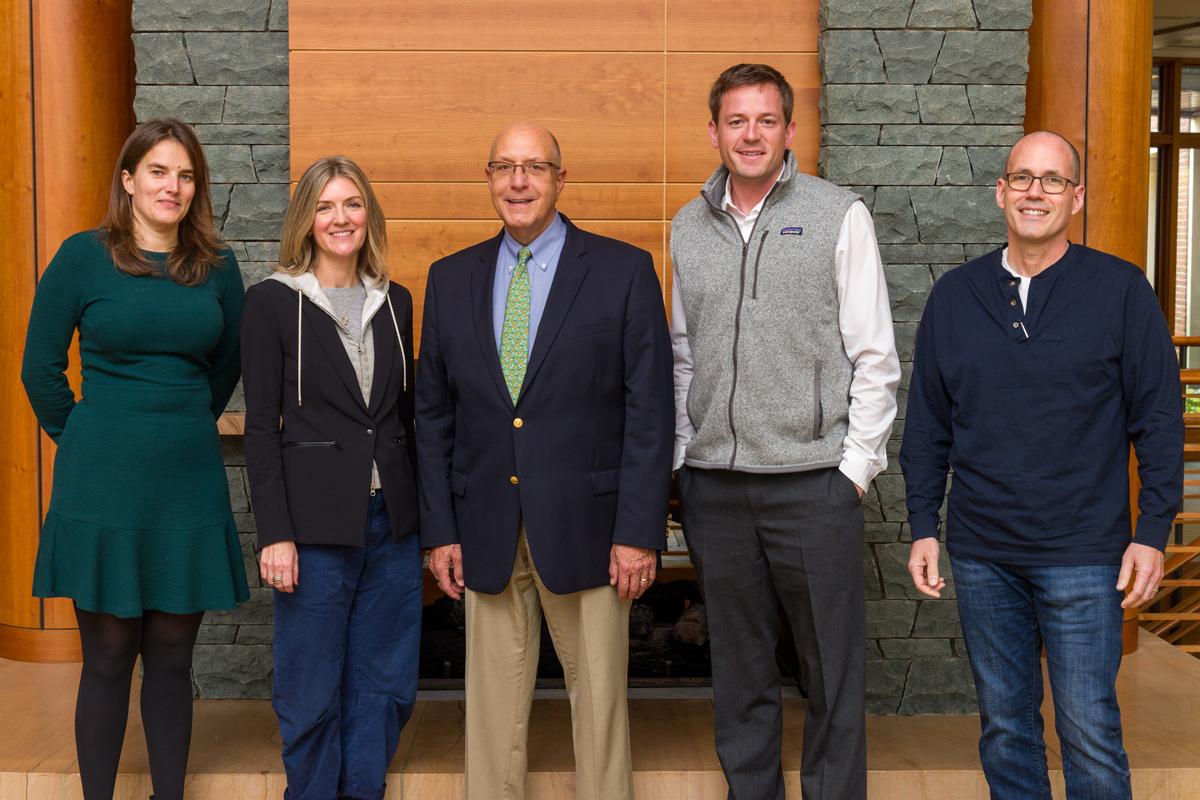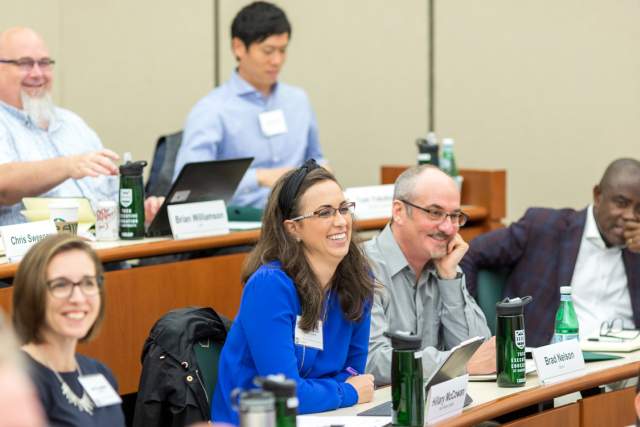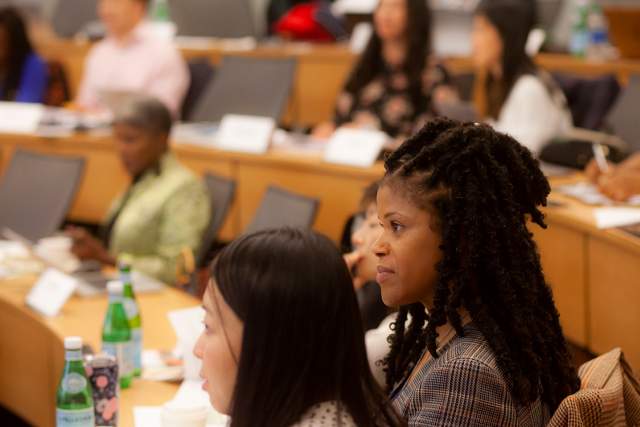There’s a certain magic to the Dartmouth experience that remains long after graduates leave Hanover. So much so that many return for events, reunions, and even programs.
Recent participants in Tuck Executive Education’s Leadership and Strategic Impact (LSI) program, for example, have included graduates of Dartmouth, Tuck, Thayer, and Geisel. While each has brought different educational and professional expertise to LSI, they share a uniquely multifaceted perspective on what makes Dartmouth and Tuck so transformative.

From left, Christina Kavanagh T’13; Liz Warner MHCDS’20; Tuck professor Paul Argenti; Scott Decker D’09, TH’11; and Justin Tidwell Th’96.
I love that I can continue coming back to Dartmouth throughout my professional career,
says Scott Decker D’09, Th’11, principal architect and cloud lead for Credera. Dartmouth continues to meet me where I am. It ’s provided what I ’ve needed at each step in my career, from the time I was 19 years old to now.
During the most recent iteration of LSI, we caught up with four participants who are also Dartmouth alumni. Here’s what they had to say about their experience—and coming home to Hanover.
Justin Tidwell Th’96
Senior Director, Data Architecture, Charter Communications
When Justin Tidwell first applied to Thayer School of Engineering, he knew he wanted a career that was both technical and managerial.
I wanted to go to Thayer because I knew I didn’t want to be in a technical engineering role my whole career,
he explained. I knew that Thayer was a place that taught people to be both engineers and executives. We did cool, geeky stuff, but it was always filtered through the lens of how that would help a company or society.
Armed with a BE and MS, Tidwell built a career in the telecommunications industry, where he has held technical, product, and managerial roles. Along the way, he earned an MBA to transition into leadership. Today, Tidwell lives and works in Colorado, where he is senior director of data architecture for Charter Communications.
Why LSI?
The MBA program I completed did not focus on strategy at a high level. I came to LSI because I wanted to better understand how to look at the marketplace and how companies can position themselves within it using the tools, people, and technology they have. I also wanted to understand how to make effective, strategic investments in research, development, and resources to get to where I think the market will be in two or three years.
What are your biggest takeaways from LSI?
In addition to the focus on strategy, there was also a big focus on developing people and figuring out how to draw out the best from your team. I was able to start using those tactical tools from day one.
Also, even though I ’m pretty self-aware, I wasn ’t necessarily aware of how my personality might lead to behavior that could undermine my team. Working closely with my cohort at LSI helped me see those behaviors, and once you see them, you can address them.
What was it like to be back on campus?
I ’ve come back and forth quite a few times over the years, including to recruit some of my best hires at Thayer. Having said that, I had honestly forgotten how much I enjoyed being in the classroom.
How would you describe LSI to a colleague?
Even if you do have an MBA, if you are interested in becoming a senior executive, the things the professors teach you are extremely valuable. And the interaction you get with other people who are every bit as smart as you and as driven as you and in the same place in their careers is invaluable.
Christina Kavanagh T’13
Director, Philips
For Christina Kavanagh, a Tuck MBA wasn’t just an opportunity to advance in her career—it also offered a pathway into a new field entirely.
I went to a liberal arts college, so three years out of undergrad, I wanted more of the business classes that I didn ’t get from my bachelor’s degree. I also knew I wanted to focus more on health care, so I decided to go back to school,
she says. Tuck gave me a good launch point to go into health care consulting.
Kavanagh, who lives in the Boston area, worked in strategy for Massachusetts General Hospital after leaving consulting and is now a director at the health care technology company Philips.
Why LSI?
At Philips, we have support for continuing education. LSI sounded like an interesting opportunity to look again at leadership at a different point in my career, with more leadership experience and experience in general. When most people go to business school, they are more junior in their careers, so it’s interesting to revisit leadership later on.
What are your biggest takeaways from LSI?
I found the leadership and personality assessment pieces really effective. Tools like Myers Briggs give you a better understanding of different personalities and dynamics of teams, and we learned effective ways to lead based on that information.
I also enjoyed refreshing on key topics that I had studied in my MBA, but with a different perspective. In particular, it was good to revisit Professors Ron Adner and Paul Argenti’s work and to learn about their newer work.
What was it like to be back on campus?
I’ve been back to Tuck a number of times, but to go back in a classroom and not be a full-time student was a little weird! Unfortunately, it was a very hectic work week for me on top of the intensive LSI curriculum, so I didn’t have time to walk around campus as much as I would have liked or to visit King Arthur Flour.
Why should your fellow MBA graduates return for LSI?
It’s good to revisit leadership at a later point in your career, with a different perspective. And Tuck MBA students, while they’re all very ambitious and from a range of fields, are mostly at the same point in their careers. It’s not necessarily what the corporate world is. There’s a benefit to having a wider range of experience at LSI.
Scott Decker D’09, TH’11
Principal Architect and Cloud Capability Lead, Credera
For Scott Decker, degrees from Dartmouth and Thayer provided a powerful base of technical and liberal arts knowledge. But a decade into his career, he knew he needed new tools to move to the next level.
I’ve transitioned from being an individual contributor and software developer to leading teams of software developers and product managers to now leading teams of teams and having organizational responsibilities,
says Decker, who is currently based in Colorado as the principal architect and cloud lead for Credera. My role doesn ’t rely on my technical aptitude at this point as much as my ability to craft a vision and a strategy and rally people around that. What got me here in terms of being very technically minded will no longer be what defines my success moving forward.
Dartmouth continues to meet me where I am. It's provided what I've needed at each step in my career, from the time I was 19 years old to now.
—Scott Decker D’09, Th’11
Why LSI?
I was looking for something to complement my very technical background with a business perspective more applicable to my current career. I found LSI and thought, ‘Perfect; I get to go back to Dartmouth!’ I looked at the curriculum, and it was everything I needed: communication, strategy, and leadership.
What are your biggest takeaways from LSI?
I took away a renewed sense of intentionality with which I communicate to my audience. And that ’s everything from developing a strategy that I want to communicate to understanding how to craft a message that’s relevant to my audience. Shane Meeker talked to us about identifying who the hero is, what treasure they’re going after, and what their opposition is. I’m working to build these frameworks into my day-to-day so that my team, and their teams, constantly remember where we’re headed.
What was it like to be back on campus?
I was struck by how timeless the campus is. There is a very comforting security in that, especially after the last few years. Everything has changed, but you come back to Dartmouth and she’s stalwart. She’s still standing.
What should Dartmouth alumni know about LSI?
Dartmouth offers a breadth of expertise, knowledge, and skill sets for every step of your career. There ’s a sweetness to me that comes from the continuity of friendship and place, and the subject matter continues to build on itself.
Liz Warner MHCDS’20
Chief Medical Officer, CDPHP
As a surgeon turned health care executive, Liz Warner understands the power of skill-building and reinvention. Now chief medical officer for CDPHP, a New York health plan, Warner earned her Master of Healthcare Delivery Science from Dartmouth just before the COVID-19 pandemic hit.
In the immediate onset of the pandemic itself, the coursework we did around crisis management, communication in a crisis, and operations was really helpful as we pivoted through lots of rapid changes in the organization,
she says.
Why LSI?
When I learned I was going to be promoted to chief medical officer, I knew I would have to navigate the waters of having a much bigger team and some big personalities around me in the C-suite. I reached out to [Professor] Paul Argenti because his work on management style and strategy really resonated with me, and I knew I needed help. He agreed to give me one-on-one advice, and he also told me about LSI, which fit the bill for helping me develop the skills to be a good leader and execute corporate strategy.
What are your biggest takeaways from LSI?
It was really interesting to do the 360-leadership assessment again, having done it a few years ago in MHCDS. I could see that in the eyes of the people I work with, I’ve grown, and I’m exhibiting some leadership styles that I didn’t possess before, which was great. But I also could see areas where I still need to develop.
I also came away with new perspectives on why certain initiatives I’ve worked on have fallen short. Now I feel like I have the tools to start fixing things.
What was it like to be back on campus?
I love coming back here. It feels so familiar to me now—I’ve been back here more times than I’ve been back to my undergrad alma mater. This feels like my home. I especially love sitting in front of the fireplace or out on the patio of Raether Atrium.
Why should your fellow MHCDS alumni consider LSI?
The challenges we face as leaders are common across all industries, so we have a lot to learn from each other. The fact that people are coming from very different roles and from different generations enhances the experience.

